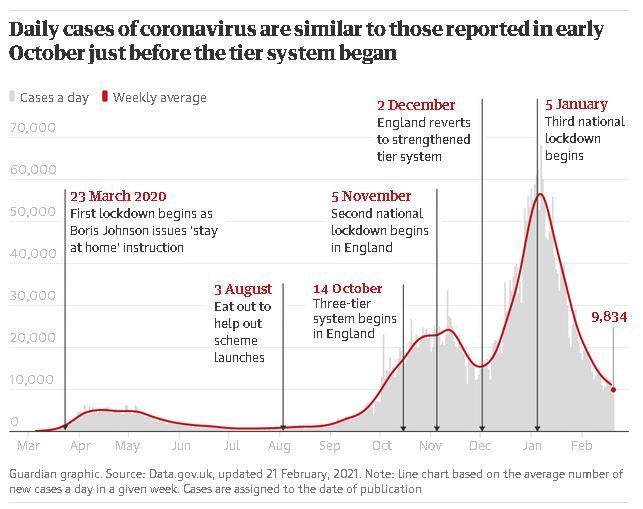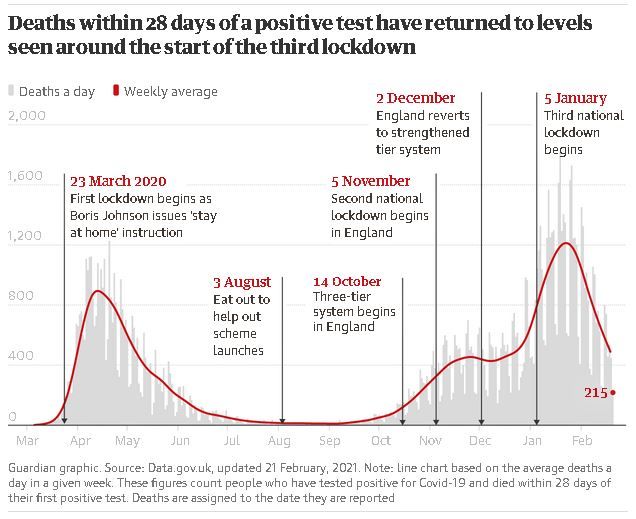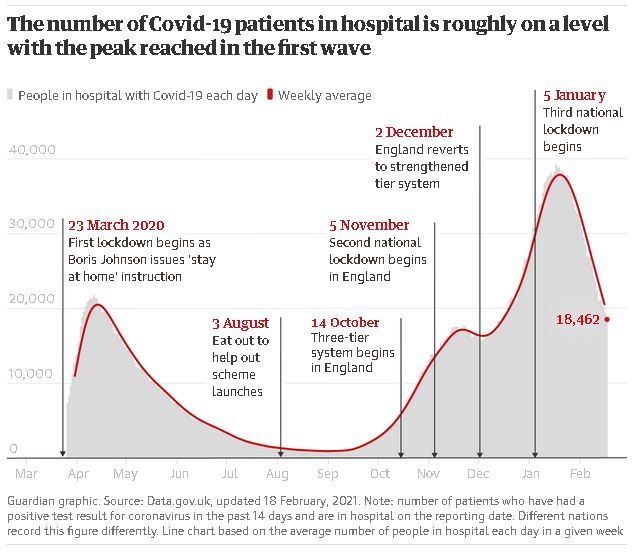
What is the science behind plans to relax England's lockdown?
With the government announcing a roadmap for lifting coronavirus restrictions in England, we look at the scientific underpinnings, advice and evidence behind the changes.
National lockdown worked – but at a price
A national lockdown was always the bluntest yet most effective tool for driving down cases. The first last spring forced R, the reproduction number, down about 75%.
But the clear benefits come at a hefty price. Documents from the Scientific Advisory Group for Emergencies (Sage) describe how school closures put children at risk of dropping out or being subject to domestic violence and abuse. Slashing social interaction harms the wellbeing, development and mental health of children and adults. Then there is the economic hit, with the poorest bearing the brunt since they are often less able to work from home.
National lockdowns are the last resort for good reason. But if imposing one is a big step, so too is unlocking the country.

Pauses between changes are key
The government’s roadmap includes a gap of about five weeks between each lockdown-lifting step.
This is because it takes up to two weeks for transmission changes to show up in case data, and another couple of weeks for knock-on effects to be seen due to the time it takes for infected people to show symptoms, deteriorate, be admitted to hospital and in some cases die. “It would take a minimum of three weeks after lifting one set of restrictions to determine whether it is safe to take the next step,” new documents from the Scientific Pandemic Influenza Group on Modelling (SPI-M) say.
Dr Angela McLean, the deputy chief scientific adviser, said there was uncertainty about the impact of each step. “Even under the assumptions of one scenario, we think there are … many different possible outcomes,” she said. “That is why we are so keen on this thing about change something and then wait so that we can see what happens; let’s live in the real world.”
The need for caution is clear in SPI-M documents modelling scenarios on relaxing restrictions, with a very real possibility of another wave of coronavirus.
Even with high levels of vaccine coverage and efficacy, a large number of people will remain susceptible to severe Covid since neither of these figures are 100%. “It is likely you get an increase in cases when you start to open up,” said the chief scientific adviser, Sir Patrick Vallance. “Exactly when that occurs and exactly how high the numbers are, it is not possible to be precise.”
Even under the most optimistic vaccine scenario and with cautious unlocking, models suggest there could be tens of thousands more Covid-related deaths by summer 2022.
Schools could increase infection rates by up to 50%
Reopening classrooms is considered a top priority. Scotland and Wales have begun phased reopenings but in England all schools and pupils are set to reopen on 8 March, raising alarm among unions.
Newly released documents warn that reopening schools is likely to increase the R by 10-50%. “SPI-M-O’s consensus view is that the opening of primary and secondary schools is likely to increase effective R by a factor of 1.1 to 1.5,” experts said in a document dated 27 January.
“An initial, limited, and cautious reopening of schools (eg primary schools only) for a time-limited period, in the absence of easing other restrictions, would allow for an assessment of the impact on community transmission.”

Outdoor socialising is lower-risk
A consistent message from scientists is that the risk of transmission outdoors is generally far lower than indoors, and this is being prioritised in the new roadmap.
Several studies suggest the majority of outbreaks are linked to indoor settings such as bars, care homes and households. One database suggests where outdoor transmission did occur, it was tied to settings such as building sites or weddings, although at least one outbreak appears to have been linked to a playground.

A national, not regional, approach
After cases began to rise in October, England was placed into a regionally tiered system. Where infection rates were high, tough restrictions remained in place for months, particularly in parts of the north, with minority communities and poorer areas often hit worse.
The approach was criticised as being confusing and complicated, with scientists concerned that the weaker restrictions in some parts of the country simply meant that, eventually, the whole country would have high infection rates.
“Initial analysis shows a clear effect from tier 3 interventions and much less from tiers 1 and 2. It is not yet clear whether tier 3 measures alone are sufficient to reduce the reproduction number below 1,” one document from SPI-M, dated 4 November, said.
The new roadmap will apply nationwide. While a one-size-fits-all approach is simpler and more egalitarian, there is still a problem. If unlocking the country ends up being governed by infection rates in the hardest-hit parts of England, it could mean areas with low infection rates might have to abide by tough rules for longer.
Vallance said rates of decline in infections were likely to vary around the country, but it was up to politicians how to tackle this. He added: “The government has said it wanted to do things nationwide in terms of steps and that is a perfectly sensible thing to do.”











